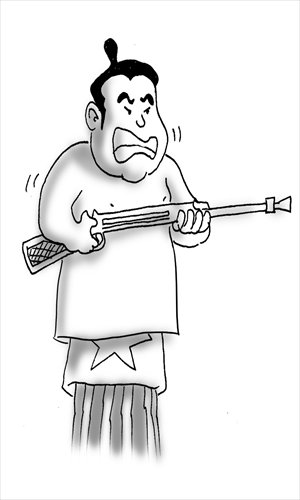Japan seeks independence through subservience to evil US ends

Illustration: Liu Rui/GT
Japanese Prime Minister Shinzo Abe may enjoy a sense of triumph in having succeeded to push through the country's new military law. Both chambers of Tokyo's parliament have now cleared the legislation expanding Japan's military power, despite widespread public opposition and even scuffles among lawmakers.
For Abe and his ruling Liberal Democratic Party (LDP), the historic amendment to the constitution allowing for overseas' military deployment, thus overturning the country's 70-year-old pacifist commitments, no doubt, in their view, marks the emergence of a "strong" Japan, asserting its "independence" in the modern world.
Ardent nationalists among Abe's party have been earnestly seeking to rewrite the country's constitution, going back several years in their efforts. They argue that Japan must have greater freedom to use its military forces if the country is to claim equal standing among modern powers. The postwar constitution forbidding any overseas' deployment of Japanese troops was seen by the nationalists as a demeaning constraint on Japan's modern-day esteem.
The nationalistic LDP perceives the pacifist constitution as an insult to the country's independence, and a humiliating fetter imposed by the victors of WWII. The constitution was largely written by the US occupying-army administration following the defeat of Imperial Japan in August 1945.
The bitter irony is, however, that the expansion of military power sought by Abe and his government is not a mark of independence, as they claim. Rather, in truth, it is a sign of Japan's deepening subservience to the US. The new legislation is heavily conditioned by US strategic interests, albeit in a modern context where Japanese military is perceived now by Washington as bestowing an advantage.
The Abe administration claims that the new military options afforded by the amended constitution will allow Japan to better protect its people and its national interests.
The paradox is that the new military laws and posture pushed through the Japanese parliament by Abe will lead to more insecurity for Japan, and will increase the danger of future conflict.
This is because Japan's adapted military legislation is framed by the geopolitical perspective of Washington. The deployment of Japanese troops and other military assets is said to be mandated "in defense of foreign allies." That means Washington.
In effect, Japan is placing its military forces as hostage to Washington's capricious geopolitics. That is hardly a hallmark of "independence" as Abe and his supporters so fervently claim.
The Japanese government supposes that the new military power is to be strictly enforced with three criteria.
First, it will only be used if Japan or an ally (most probably the US) is attacked or threatened. Second, the military option can only be used if diplomacy has been exhausted. And third, any military force used will be only at a minimum level.
Japan's expanded military power has to be interpreted in the context of gross historical revisionism under Abe's LDP. The Japanese leader and his ruling circle have repeatedly sought to absolve Japan from its horrendous war legacy.
The denial of Japanese aggression against China, costing up to 30 million Chinese lives, or the denial of "sex slavery" of Chinese and Korean women under Japanese colonial rule, are disturbing indicators that the present leaders in Tokyo have rekindled a militaristic mind-set.
Therefore, in the context of malleable criteria for deployment of military force and under the sway of an increasing US belligerence in the Asia-Pacific region, the Japanese security laws are cause for deep concern.
Abe's repeated regurgitation of provocative US allegations against China, from cyber theft to territorial expansionism, only further emphasizes the cause for concern.
China's often-stated policy is one of friendly regional dialogues to resolve disputes. Disputes should primarily be resolved by Asian neighbors, acting autonomously, independently and free from outside interference.
Japan's newfound militarism is regrettable and does not bode well for regionally resolved peaceful relations, because Tokyo's agenda is beset by atavistic nationalist sentiments, and more worryingly, because it is subordinate to Washington's hegemonic geopolitics.
The people of Japan are right, and they deserve much credit, to be indignant over Abe's pursuit of expanded military power. His claims of patriotism and to be serving to defend Japan's interests are in fact the inverse.
Abe is actually serving the US interests and in so doing he is militating against the real interests of the Japanese people.
The author is a freelance journalist writing on international affairs based in Addis Ababa, Ethiopia. opinion@globaltimes.com.cn